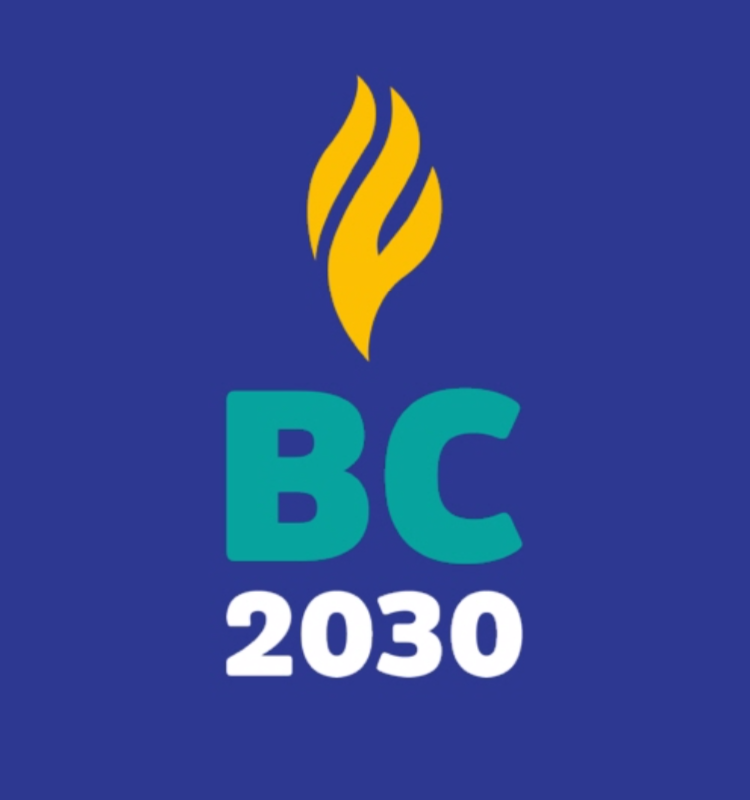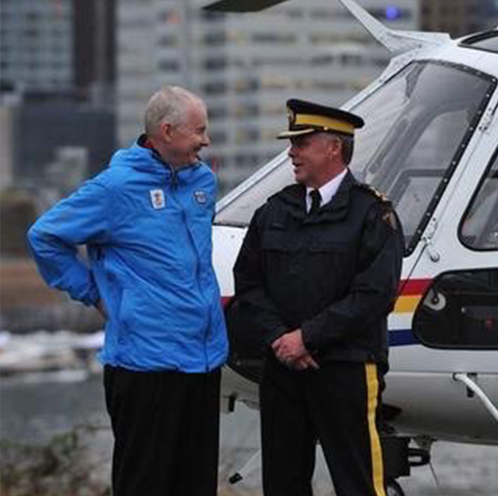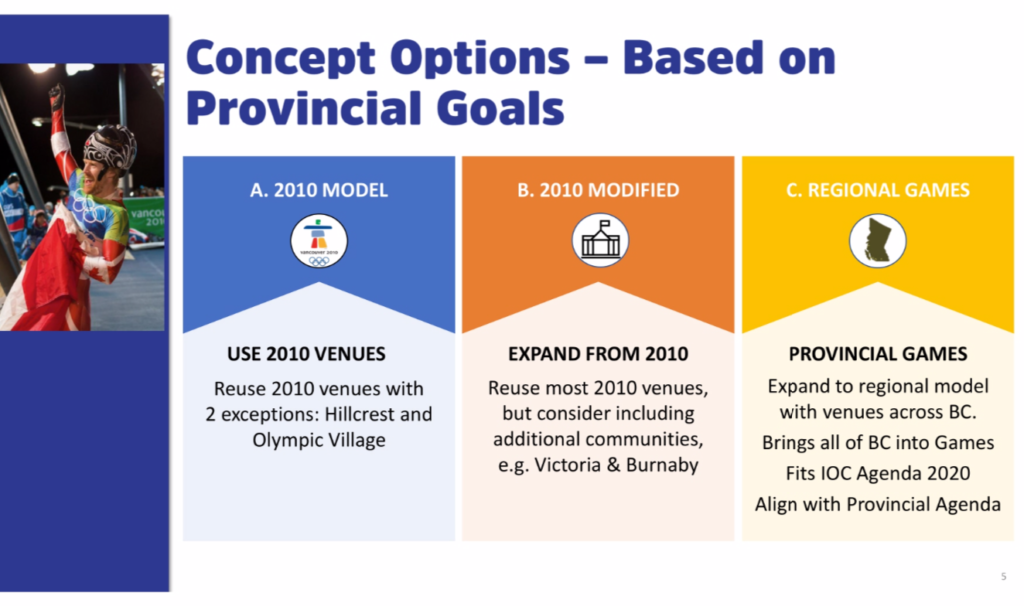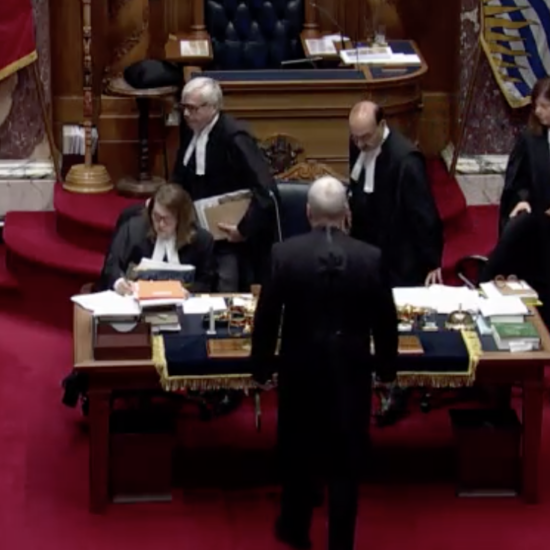
Bob Mackin
A presentation to a senior bureaucrat in the B.C. NDP government suggests bidders for the 2030 Winter Olympics and Paralympics are eager to negotiate a backroom deal to bring the Games back to Vancouver.

John Furlong (left) and RCMP Olympic security head Bud Mercer in 2010 (BudMercer.ca)
theBreaker.news exclusively obtained a copy of a March 17 Powerpoint presentation by John Furlong, the Vancouver 2010 organizing committee CEO, to Assistant Deputy Tourism, Arts and Culture Minister Asha Bhat.
Twice in the BC 2030-branded presentation there are references to preferred candidate status.
The International Olympic Committee is facing a shortage of Games host cities due to spiralling costs and corruption scandals. New IOC policies seek to replace expensive bidding wars with negotiations aimed at the early awarding of hosting rights.
In February, the IOC named Brisbane the preferred candidate for the 2032 Summer Games. In July, before the Summer Olympics opened in Tokyo, the IOC rubber-stamped the Australian city as the host, four years before the scheduled host city vote.
Under the heading “winning conditions,” the BC 2030 presentation states: “New IOC process is simplified and tailored for an existing Host City to bring the Games home again.”
“Opportunity to achieve preferred candidate status; 2034 will have increased competition,” said the presentation. “The timing may never again be this favourable for Canada to win.”
It identified potential competitors as 1972-host Sapporo and 2002-host Salt Lake City, both of whom could be adversely impacted by Summer Olympics in their countries: Tokyo 2020 and Los Angeles 2028.
The presentation said a European bid is unlikely, but a group is exploring a joint Spanish/French/Andorran Games for 2030.

From BC 2030 bid presentation to the Ministry of Tourism, Arts and Culture (BC Gov/FOI)
The BC 2030 presentation suggests three hosting concepts, none of which carry cost estimates:
- “2010 Model”: Reuse Vancouver 2010 venues, with the exception of the Hillcrest curling complex (now a community centre) and the Olympic Village (which is fully occupied);
- “2010 Modified”: Reuse most 2010 venues, but consider including additional communities, such as Victoria and Burnaby; or
- A regional or provincial Games, with venues across B.C.
The presentation was thin on details, but heavy on platitudes. It claimed the 2030 Games could be the “most sustainable” Winter Games bid ever, carbon-neutral and privately funded. The source of the private funds was not mentioned.
The estimated cost of $2 billion for Games operations does not include building an Olympic Village, renovation or expansion to existing venues or Games-time security. In 2010, the RCMP and Canadian military spent $900 million.
In smaller print, the presentation includes this disclaimer about costs: “Excludes choices governments may make to leverage the Games to invest in infrastructure, community and/or legacy initiatives.”

BC 2030 Olympic bid logo (BC Gov/FOI)
One of the slides claims “very positive” initial conversations with First Nations and “Measured and positive early conversations with Federal Government, Whistler, Richmond, Burnaby, Vancouver.”
Another slide mentions opportunities for housing and transportation mega-projects, specifically the Arbutus to UBC SkyTrain, and suggests the 2010 Four Host First Nations could reunite in 2030 and use the Games to meet goals of the Truth and Reconciliation Commission and Declaration of the Rights of Indigenous Peoples Act (DRIPA).
Furlong’s BC 2030 bid team includes five former VANOC executives: marketing vice-president Andrea Shaw, sport vice-president Tim Gayda, communications director Chris Brumwell, Games operations managing director Mary Conibear and commercial rights management director Bill Cooper.
Four are consultants, while Brumwell is vice-president of communications with Canucks Sports and Entertainment.
The Aquilini-owned Rogers Arena could be the main hockey venue in a 2030 bid. The owners of the Vancouver Canucks are also hoping to build a new ski resort near Squamish.
The IOC wants to choose the 2030 host no later than 2023, but questions remain about how much VANOC spent on the 2010 Games and who got paid what. Board meeting minutes and financial files remain off-limits to the public until fall 2025, under a post-Games agreement with the City of Vancouver Archives.
Questions also remain about Furlong’s past. His 2011-published Patriot Hearts memoir omitted his past as a gym teacher at a Catholic day school for indigenous children. Six members of the Burns Lake band accused Furlong of child abuse dating back to 1969. None of the allegations has been tested in court. Furlong denied any wrongdoing.
The Canadian Human Rights Tribunal will hear their complaint against the RCMP, which alleges the Furlong file was closed due to anti-indigenous racism and favouritism for Furlong.
Support theBreaker.news for as low as $2 a month on Patreon. Find out how. Click here.











